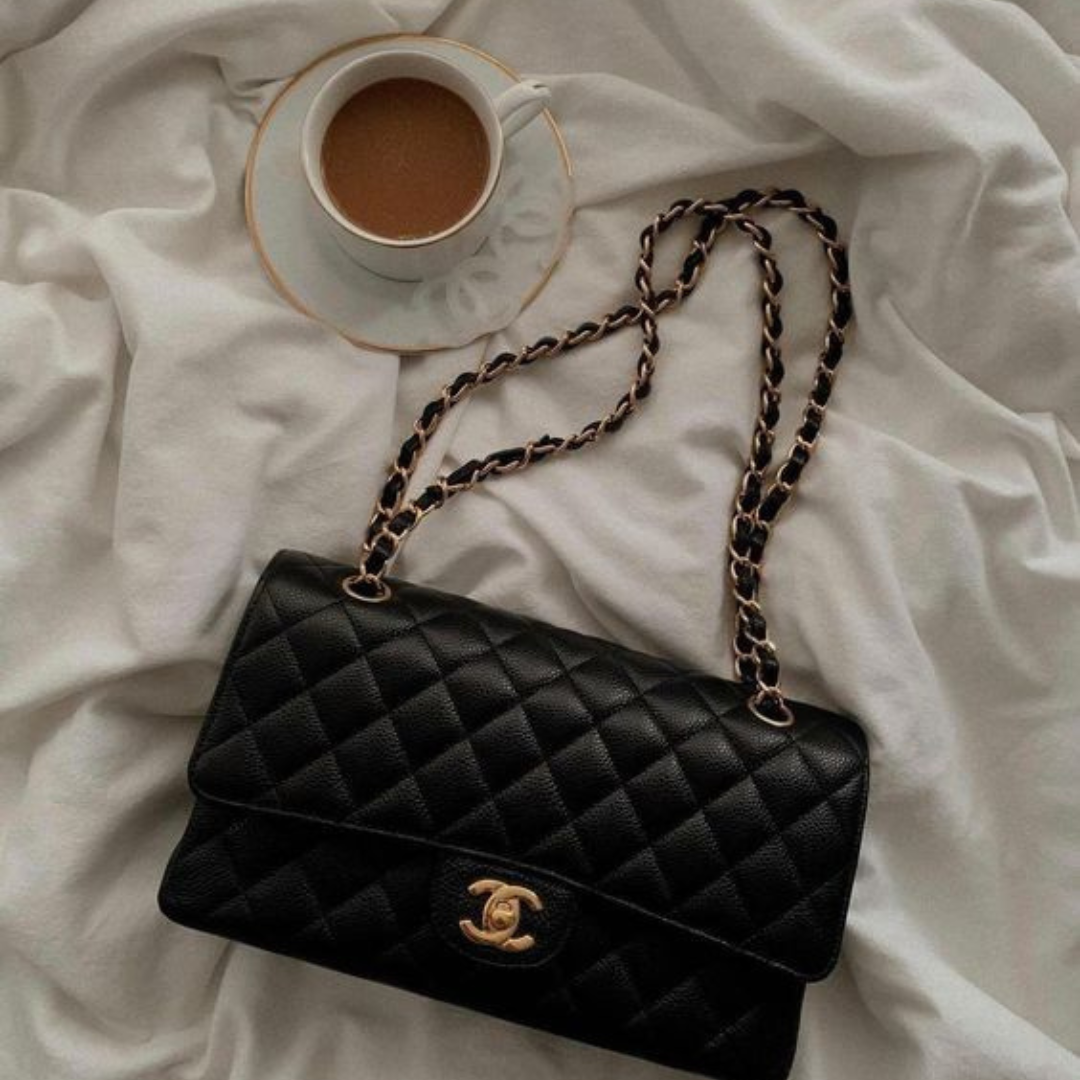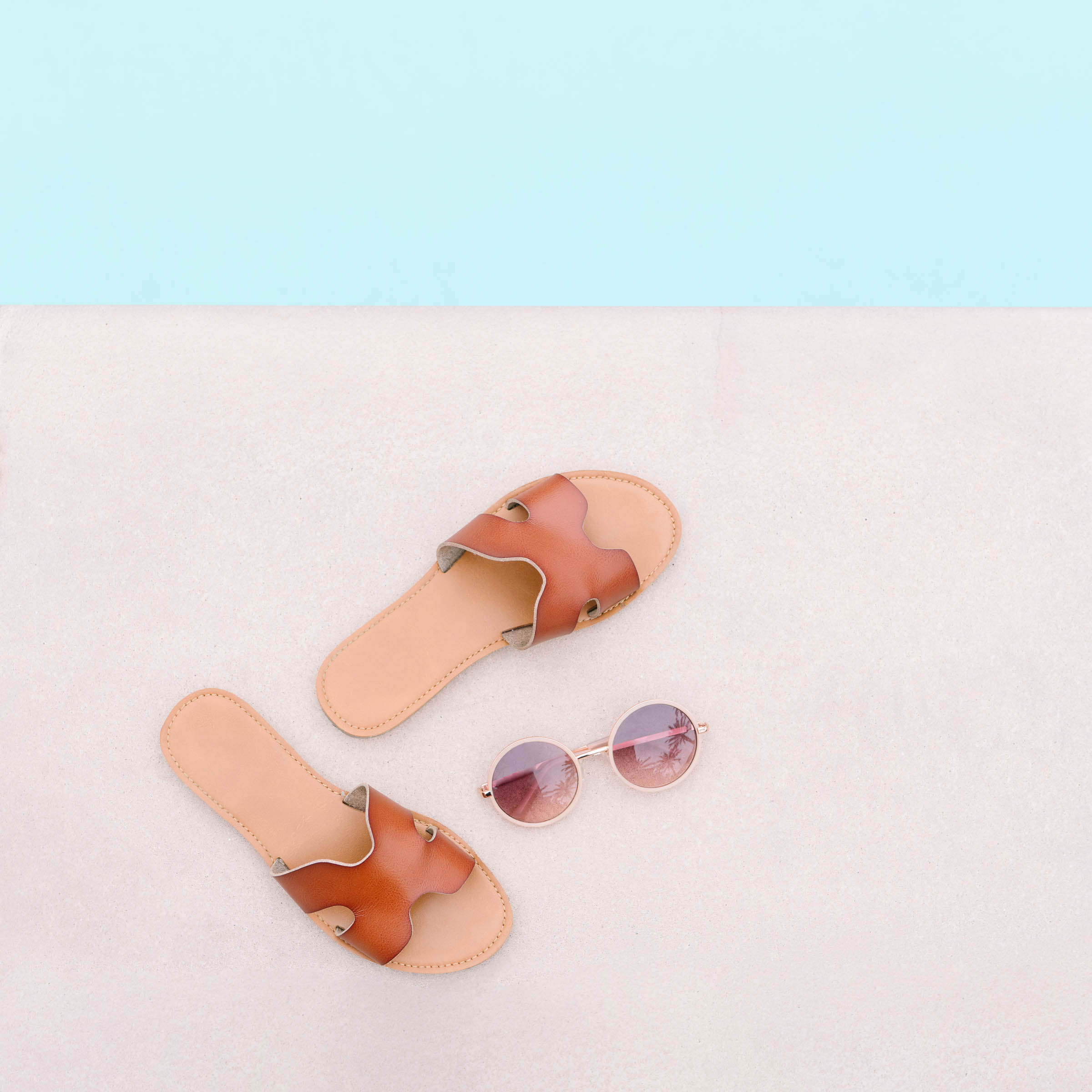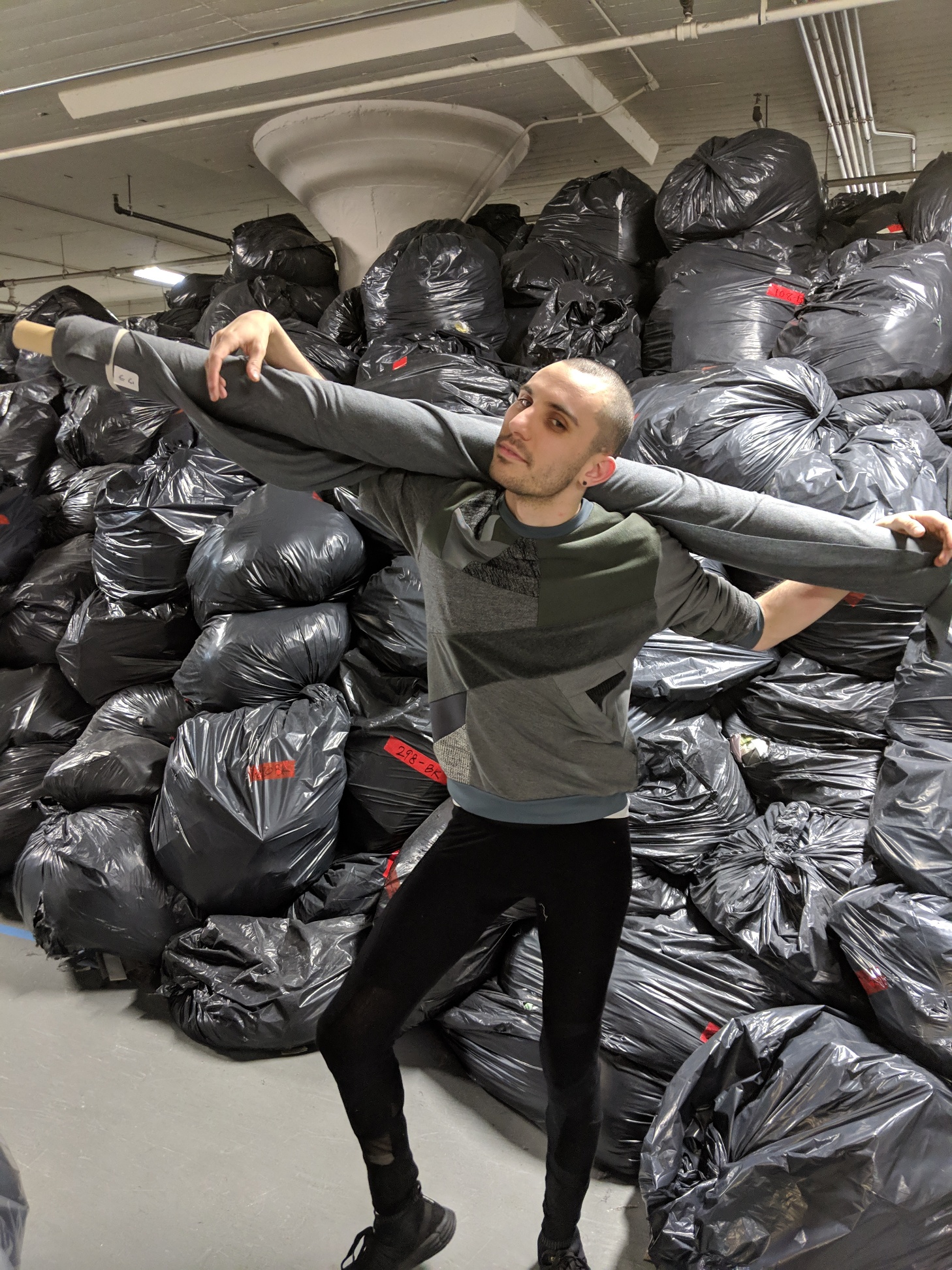
Talking Zero Waste with Daniel Silverstein, founder of ‘Zero Waste Daniel’
Today we’re talking to Daniel Silverstein however, you might know him better as “Zero Waste Daniel”, founder of the zero waste fashion brand. Daniel has always worked in fashion but after realising how much waste is produced in standard fashion manufacturing, the fashion designer decided to launch his own fashion label, aiming to make use of all fabric scraps and now wasting anything! That’s how Zero Waste Daniel was created!
Words: Luisa Kearney, Editor-in-Chief
Photography: Zero Waste Daniel
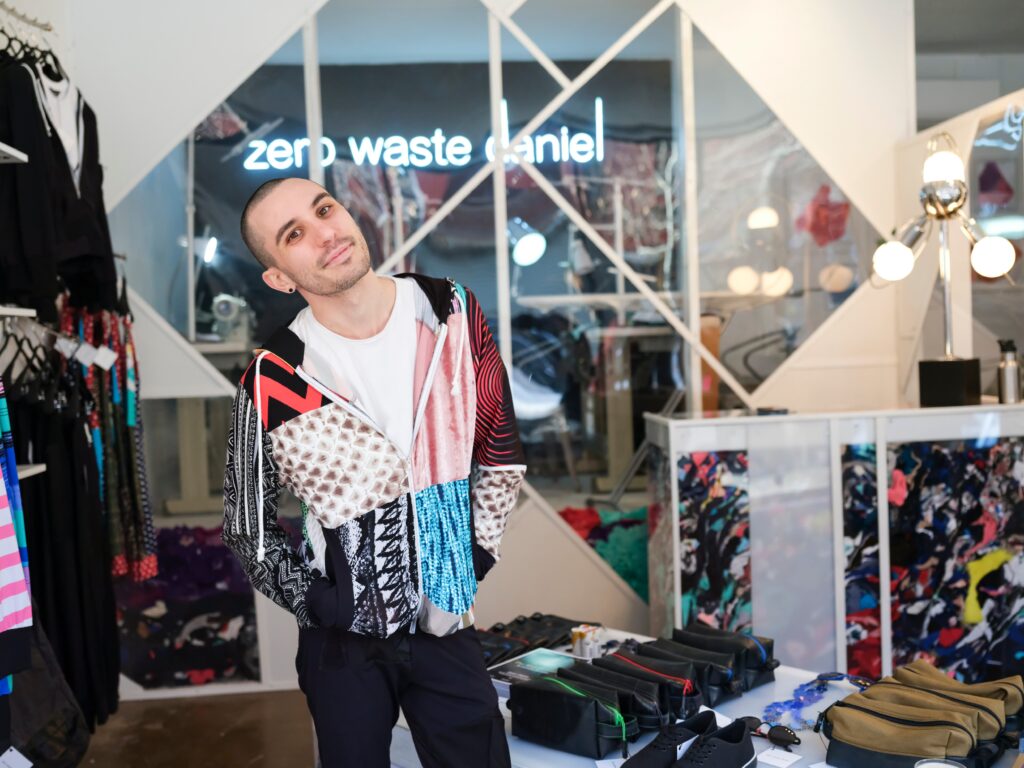
Quest Magazine: Daniel, your brand is really unique, and I have personally followed your brand for a couple of years now. What made you start Zero Waste Daniel?
Zero Waste Daniel: Thanks for saying that. You know I think one of the things that makes any designer start a line is that they feel they have a unique prospective. And I feel like I had this duality in my goals – one was to be a designer and communicate – you know visually what I like and the other was to start putting personnel beliefs and ethics into the product process. I didn’t see any examples of a company that was doing it in a way that I wanted to join and be a part of. So I knew I had to start something.
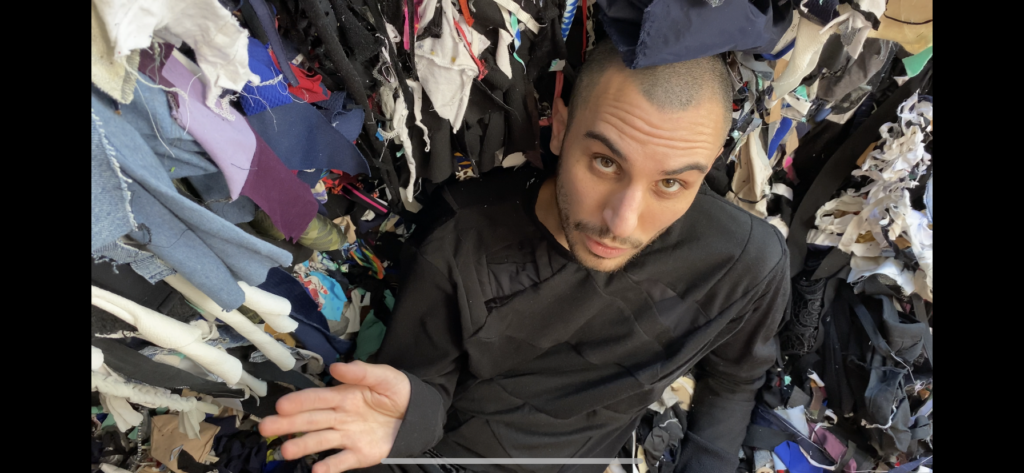
QM: That’s great. Yes I think it is always really nice when you can merge your own interests with also your beliefs. I think we see more and more businesses now doing that don’t we. Where there is a backstory and it’s not just a business, there is a story behind it – there are beliefs behind it.
ZWD: Yes mission driven businesses are statistically more likely to succeed. And that wasn’t something I knew when going into starting a business. But, it was something I really found myself becoming a part of that and as I saw other upcoming emerging designers start and close their businesses even though I certainly faced my share of hardships, I always found myself sort of prevailing and moving forward.
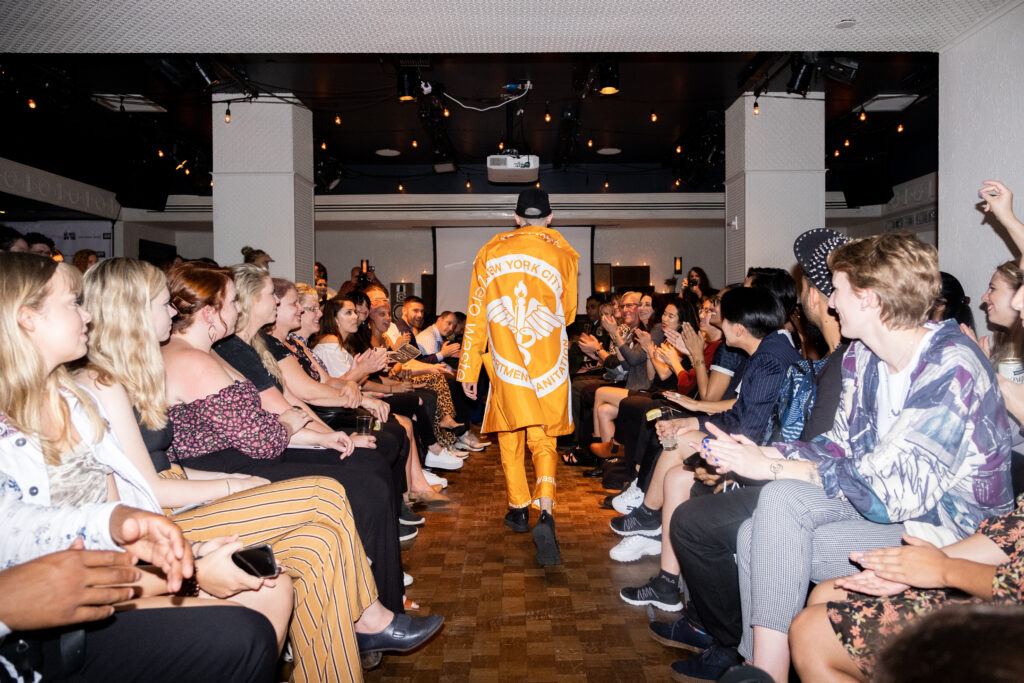
QM: So, as far as I’m aware, your brand works with off cuts and fabric waste?
ZWD: Yes, off cuts, leftovers, dead stock, all kinds and a mix of hard to recycle and likely to be thrown away materials.
QM: How easy is it working with off cuts and waste in comparison to whole rolls of fabric?
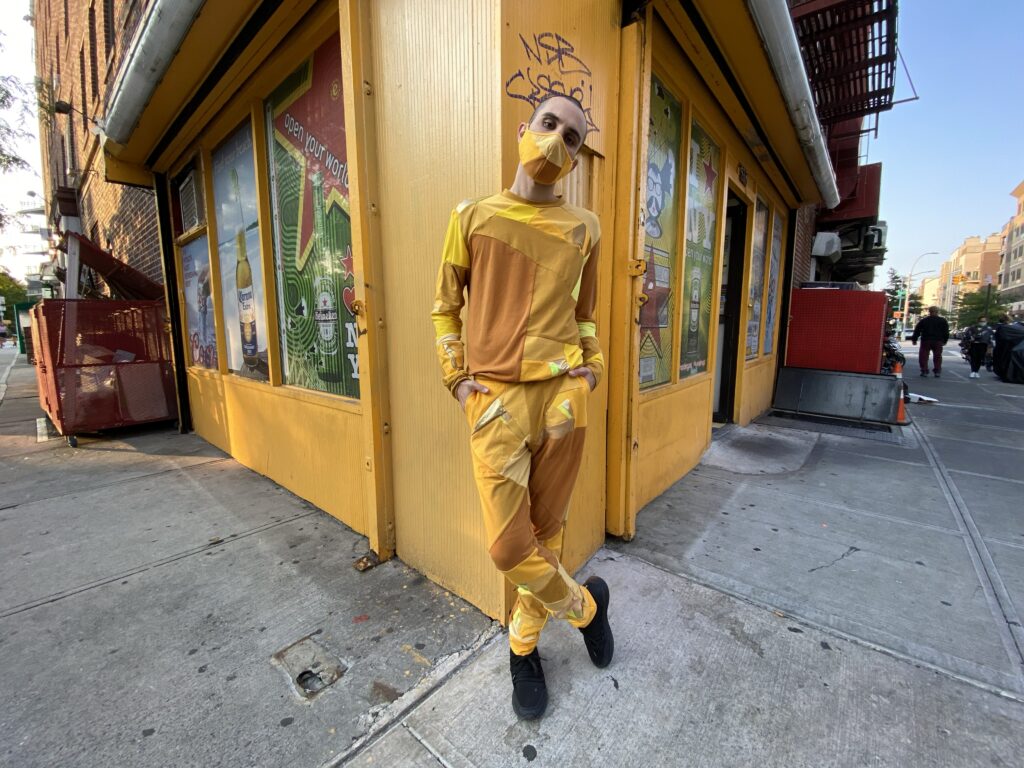
ZWD: Yes, sometimes we do get to work with the whole rolls of fabric because scrap of an industrial level can be 8-10 yards of leftovers, so sometimes we’re cutting things in a traditional way.
But what it interesting about that is we don’t have 400 yards of the same material, it’s 5-10 of this, one of that, 3 of this, 50 of that, so what we have to deal with and what we deal in and celebrate is that no two pieces will ever be alike and that is something that we really hold very precious to the mission of the brand and the look of the brand because we want our customers to expect that uniqueness from us.
But, in terms of production it creates a challenge. You know, first we have to make sure that whoever we are working with – who’s on the team if it’s a contractor or factory, we have to make sure they really understand our mission and what we are doing because there are so many points where waste can fall out of the loop. So, it is really about saying you are going to do the job you do like cutting, sewing, stitching and steaming but it’s about collecting the waste and bringing it back that is the biggest change for most people. You know in terms of garment production in general it is always a nightmare. It doesn’t matter if you’re doing couture or something for JC Penny or everything in between. It is challenging, time consuming, and logistical intense work because fabric is coming from somewhere, its arriving somewhere else, your cutting multiple sizes, there’s combinations, there’s finishing techniques, labels, there’s so much that goes into it so I think from a complication level this sits right on the same kind of bracket as anything else in the price point. What is interesting about it is that because we only sell direct to consumer we’re able to put a lot more fairer labor into our pieces and charge a competitive price than if we were to sell them in store.
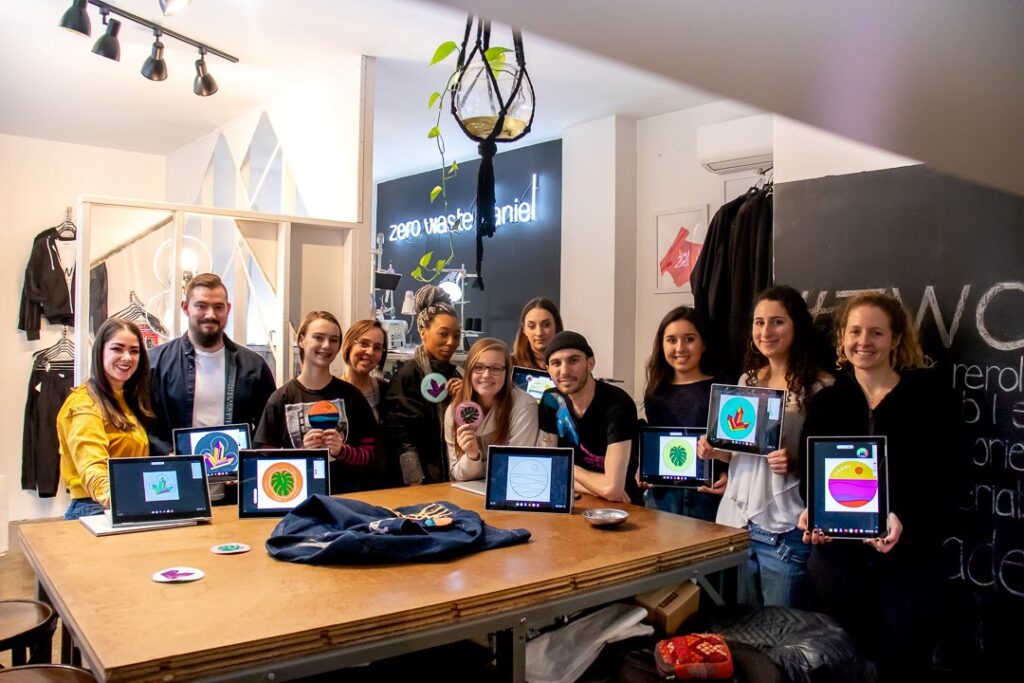
QM: Yes that makes sense. So, during the design process what comes first the fabric or the design? Do you see what fabric you have and base the designs around the fabric you have or do you create the designs and use the fabrics you have?
ZWD: That’s a great question. I would say it is mostly fabric first because our goal is always to use what we have. Over the years I have used so much fabric, but I also been collecting the off cuts, and off cuts change – Right! So, as we have made more patchwork we’ve ended up with more teeny little shreds and weird pieces and we have to collect a lot of that before we can put anything into production with it. So, the materials are always informing the design, and they’re also always changing. But, there are some cases especially with more of our mosaic designs where you know its hands, flowers or something like that I might know going into it that I might want to make something in that genre, let’s say, but I will choose from what I have so I will make a paper pattern and then you know the colors and fabric I have on hand will form what it will ultimately look like. But, I would say about 90% of the time it is fabric first.
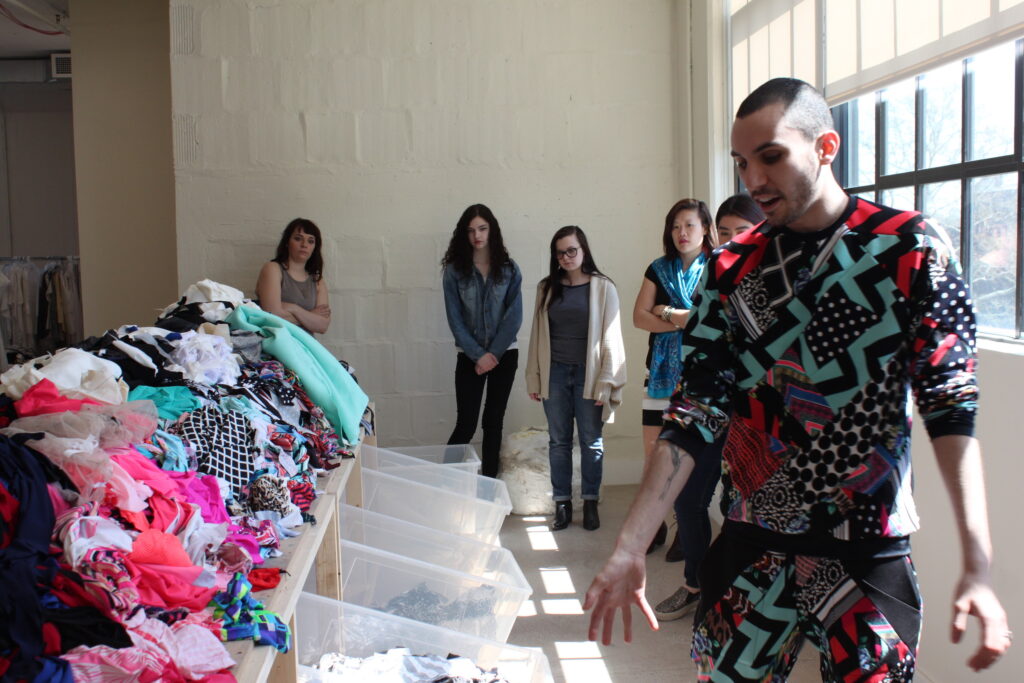
QM: That is really interesting. I have always wondered that because sometimes I have seen the motives on your t-shirts that have been pieced together from tiny pieces of fabric. I was wondering whether you work from the tiny pieces of fabric to make bigger garments – it is really interesting how you work.
ZWD: Yes, you know I would say a little bit of it is like the secret sauce but the part that I think is most applicable to most sustainable designs is that I modularize a lot of it. So doing one step at a time, because anyone who cuts and sews, can cut and sew but to get someone to start at the beginning and make you a full garment is really hard so there’s the you know there’s putting the scraps together of it, there’s the pattern part of it, there’s the cutting part of it, and then there’s sewing part of it.
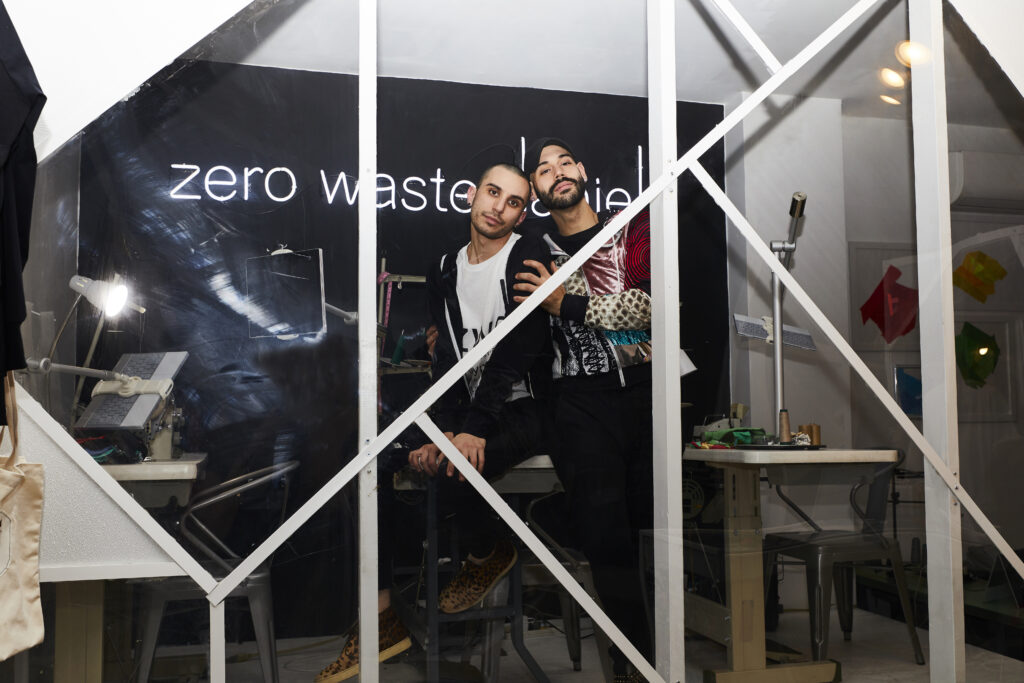
Mostly we start with the fabric first, so that is we can go through that whole process and someone who’s just sewing the garment together might not have to deal with any of that complicated patchwork, but someone who’s really good at patchwork who loves getting their hands on the nitty gritty and their super creative doesn’t have the patience for the faff free finishing that we want on it. So, it’s really always about separating out the jobs and modularizing the pieces.
QM: Yes, that’s a really good idea. I think a lot of people do that in business, and I think you get better results that way from each individual person.
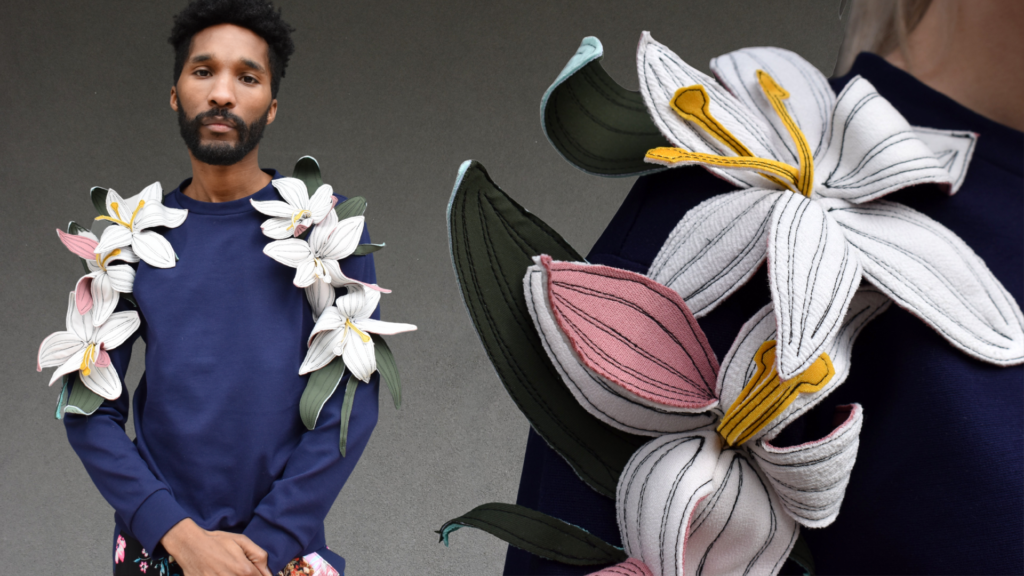
ZWD: Right, you want people who specialize in what they do to do their best work for you.
QM: Yes, exactly. A different question, do you accept fabric donations, just out of interest? And is there a way that people can get involved by donating fabric or something, unwanted or unused clothing to you?
ZWD: We take on donations in two different ways on a case by case basis. So, from B to B we definitely are always looking for partnerships where if you’re a business making cut and sew knits and you have similar materials to what we use we are always interested in taking on pre-consumer scraps, so you know if that’s stuff coming out of a design studio or out of a factory as long as its applicable we interested but our space is limited so were pretty picky about what were able to take. We also looking for high quality trash so you know especially brands working with organic or domestic or high-tech materials we are looking for the best trash we can find to pass along to our customers. Then on a consumer level the only donations we really take are more up cycles. The only donations we really take are more up cycles so if you have old college t-shirts, that you love that don’t fit you right like with a hole or a stain we are able to take them up cycle them and sell them back to you but they never enter our production stream. So it will always be as a custom order for a customer.
QM: That’s a really good idea. I really like that idea of selling them back to the customer.
ZWD: Yes we like business like that but I do think it can be cost prohibited because we have to sort of halt production to make one of a kind piece for someone and a lot of the time the perceived value of a sweat shirt or t- shirt doesn’t quite match what the labor that goes into that custom piece is so it takes a pretty special type of customer, but we done several of them and they’re pretty cool!
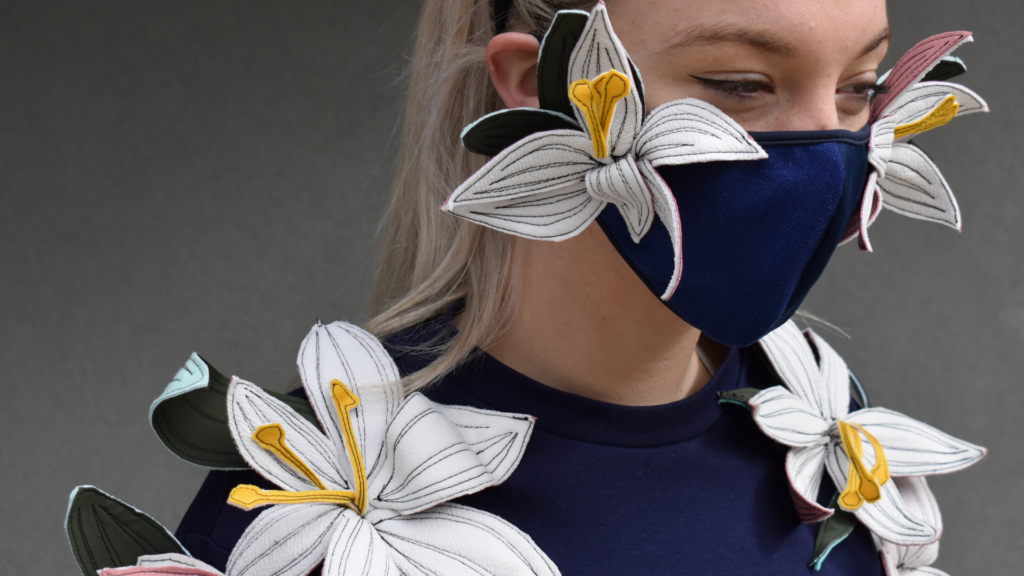
QM: Great! So, what exciting projects are you working on at the moment?
ZWD: Woo! Ok so we just launched our summer collection which really, really excited about. We moved to a whole new website and platform, and a sort of a fresh look for Zero Waste Daniel and right now I am developing some projects that are more like media basing and I am really really excited about and I think they are more about my journey as a designer as been unique in the sense that I grew up in the ‘Project Runway’ era so peoples’ relationship to fashion has a lot to do with media, TikTok, Instagram and Netflix and so I see zero waste fashion entering space in the future and I want to be a part of that movement.
QM: That’s great and I think it is such an exciting movement isn’t it, the sustainable fashion industry? It’s great to see everybody doing so many unique things and getting involved and it’s really interesting to see how the future pans out for the industry as well.
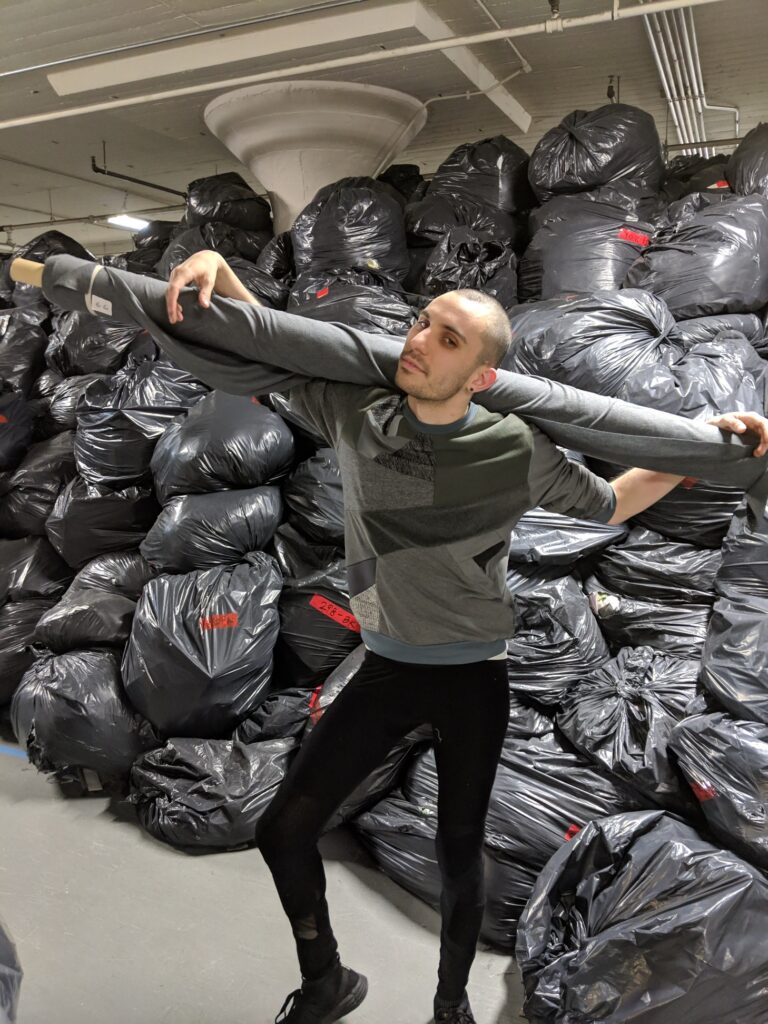
ZWD: I am excited because I think you know when I came up as a designer I graduated from FIT in 2010 and it was sort of at the boom of cross branded collaborations you know we’re seeing that sort of hit a saturation point right now but when I was in college it’s like Prabal Gurung for Target was like a major big deal and then Sofia Vergara for Kmart was like a major deal and it sort of seemed like you needed to be a celebrity already to launch a brand and I think what we are seeing now is that you can build your own TikTok following you can build your own Instagram following, you can do your own unique thing and that is able to reach so many people in a way when it couldn’t 10 or 11 years ago.
I am excited to be part of that movement where what I have built organically is now culturally relevant.
QM: Yes absolutely. Is there anything else you’d like to add or any tips you’d like to share on living a zero waste lifestyle?
ZWD: You know nothing in particular, other than I think for your readers or anyone in any industry whether it’s food, fashion, architecture, art, design like it doesn’t matter, you can be in tech – there’s always an opportunity to illuminate waste. Whether it’s a waste of your time, a waste of natural resources, a waste of materials there’s waste everywhere and people in the zero waste movement I think generally fall into two categories. There are the people who are obsessive about not producing waste and then there are the people who take this philosophy through their lives and I just encourage people to see this as a point of inspiration and take it through their lives. Start looking for waste everywhere and if you can turn it into something positive. Whether it’s the wasted time on your commute now becomes listening to audio books or the wasted leftovers now become your compost, or the wasted fabric now becomes your business it can be in any aspect of your life. I think that it’s a beautiful positive way to make a change and I think it is something that gives us that little bit of that feeling of control over our own impact and you know, especially when the climate crisis is feeling really overwhelming and everyone feels so much pressure to be in constant contact I think that this is the really great philosophy that can help you centre yourself. So I encourage anyone in any field at any point in their life to start participating in zero waste.
Facebook @ZeroWasteDaniel
Instagram @ZeroWasteDaniel
POST A COMMENT
You must be logged in to post a comment.


